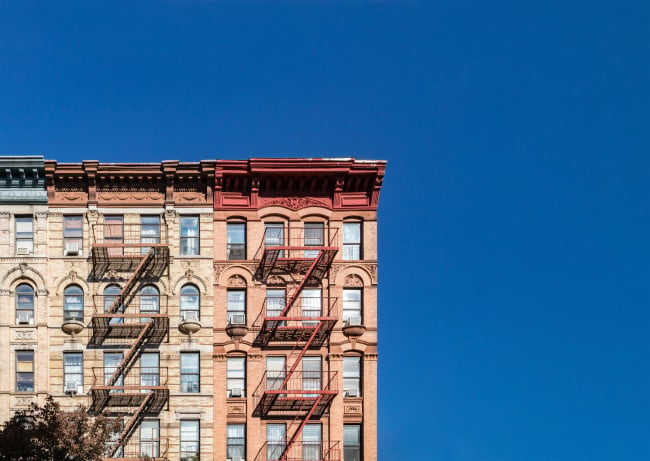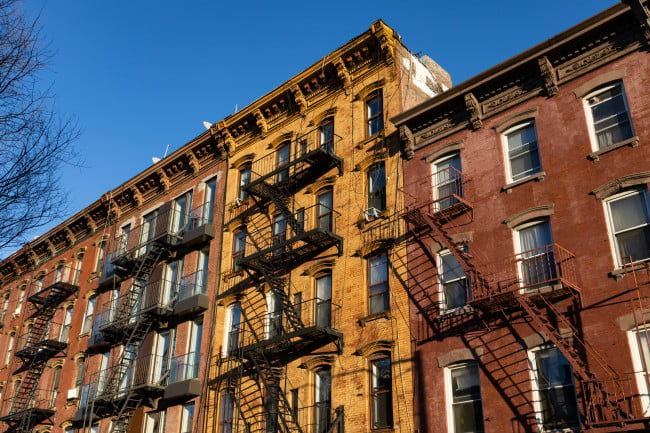What to expect if you are being evicted from your NYC apartment
- To be evicted, your landlord must go through a court process. They can’t just change your locks
- You absolutely should go to housing court to defend yourself if you receive an eviction notice
- Some renters can require landlords to justify their eviction under the new Good Cause eviction law

Your landlord must first notify you that they are suing you and what your next steps are through a notice of petition.
iStock
Evictions surged in New York City last year, nearly tripling the prior year, with city marshals completing 12,000 evictions.
It's important to know what to expect if you are faced with an eviction. It is a process that involves the courts—and your landlord has to win the case. They can’t just change your locks and put your possessions on the street.
Your landlord also now has to justify your eviction or a high rent increase if your building is covered under Good Cause eviction protections, which was part of the state budget passed in April. Before Good Cause, your landlord did not have to have any reason to evict you if you were a market-rate tenant, said David Hershey-Webb a partner at Himmelstein McConnell Gribben & Joseph (a Brick sponsor FYI).
“I would have to tell people yes, [your landlord] doesn’t need to have any reason not to renew your lease,” Hershey-Webb said. “I was telling people that in 1985, so I guess it took a while—almost 40 years—[to change the law]. But I felt it was wrong back then.”
Read on for a breakdown of the steps involved in an eviction.
[Editor's note: A previous version of the article ran in January 2020. We are presenting it again with updated information for May 2024.]
There are two types of eviction: a holdover case and a non-payment case. In a holdover case, your landlord wants both back rent and possession of your apartment. In a nonpayment case—the majority of eviction cases in the state—your landlord is just looking for you to pay your rent, and they may not require you to move out.
In a nonpayment case, your landlord has to send you a letter asking for overdue rent and warning you about an eviction before they can even start the eviction process. That warning is called a demand letter, and your landlord has to wait 14 days after sending you that letter before they can start an eviction. Your landlord also needs to send you notice in a holdover proceeding, but the type of notice and timing varies, Hershey-Webb said.
In either case, your landlord must first notify you that they are suing you and what your next steps are through a notice of petition. That document should also contain how your landlord warned you about the eviction, such as through a demand letter, Hershey-Webb added. Your landlord also has to tell you why they are suing you—i.e. what they think you’ve done wrong—through a petition.
How would I get a petition?
The petition can be served—legalese for how you receive the information—in one of three ways.
It can be handed to you directly or left with a roommate or someone who answers your apartment door (as long as they’re of an appropriate age and discretion) and mailed to you, according to a guide to the New York State court system.
Or, it can be posted to your door and mailed to you if other attempts to serve you were unsuccessful, according to the court system. This last option is often called "nail and mail." If you’re not sure what these documents look like, the Met Council on Housing, a tenant’s rights organization, has some examples online.
What do I do once I’ve received a petition?
Your next step depends on what kind of proceeding it is. In a holdover proceeding, you have to go to court on a specific date, while in a non-payment case, you have a certain amount of time to go to court to file your answer and get your first court date, Hershey-Webb said.
The notice of petition in a holdover case tells you when and where you need to be in court. You should absolutely show up, said Andrea Shapiro, the director of programs and advocacy at the Met Council on Housing.
“You need to show up to your court case,” Shapiro said. “Defendants are expected to show up in person.”
If you fail to show up, your landlord could ask for a default judgment, which would allow them to evict you unless you can challenge that judgment. The Furman Center, a New York University research institute, estimates that 40 percent of issued eviction warrants are the result of a default judgment statewide.
“If you don't show up you could be at risk of the court entering what is called a default judgment, which means the landlord [usually] wins,” Hershey-Webb said.
What happens in court?
In a holdover case, usually tenants ask for an adjournment to have time to find an attorney, or the court may assign a tenant a lawyer, Hershey-Webb said. If you are facing eviction, you can get free legal services at your initial court date, if you meet the income requirements, according to the city.
In a nonpayment case, you will file your answer in court and you can still ask for an adjournment when you are in front of a judge. You can file an answer in person or in writing (and can check out an example answer at the end of this online court guide).
At this point, it’s best to get a lawyer, who can help you file your answer in either a holdover or nonpayment case. Hershey-Webb advises tenants not to talk to the landlord’s lawyer without their attorney present. You don’t want to be pressured into signing an agreement, like a payment plan, that you don’t understand, he added.
“Never sign anything you don't completely understand—completely,” Hershey-Webb said. “Don't take legal advice from the landlord’s attorney. They are not there to help you.”
What defenses can I use?
You can defend yourself in your answer in a variety of ways, depending on your situation.
For example, your defense may be that you don’t owe the money, or you’re a rent-stabilized tenant and have additional protections, or you were being overcharged. You may claim your lease wasn’t over, you’re being illegally kicked out, you weren’t served the notice papers correctly, or there are poor conditions in the apartment that lead you to withhold rent or move out.
There is also a new protection for thousands of market-rate tenants in NYC: The new Good Cause eviction law essentially requires a landlord to have a good reason to bring an eviction case. In addition, your landlord is required to notify you if you’re covered by Good Cause during an eviction, Shapiro added.
If your building is covered under the new protections, Good Cause allows you to challenge rent increases above 8.82 percent (in 2024).
“If you fit within the Good Cause rules, and the landlord is trying to increase your rent more than is allowed under the Good Cause provisions, that may be a defense,” Hershey-Webb said. “If the landlord didn’t put in the petition the provisions required by the Good Cause law that may be a defense.”
It also gives you the right to renew your lease and forces your landlord to give a reason that they are evicting you—something owners did not previously have to do for market-rate tenants, Hershey-Webb added.
So, if your rent went up and you couldn’t pay the increase leading to a nonpayment case, you could use Good Cause to challenge the increase and as a defense against an eviction. But it’s worth noting that the law passed in April, so the argument has yet to be tested in court and it only applies to cases that began after April 20th.
What happens if I lose my case?
The vast majority of cases are settled, Hershey-Webb said. Otherwise, your case could either end after a motion or a trial. In the worst-case scenario, the court sanctions your eviction by issuing a warrant (a document that permits a sheriff or marshal to remove you from the apartment).
You then have a limited amount of time in which to remove yourself and your belongings from the apartment that will be outlined in a marshal’s notice, also known as a notice of eviction.
It’s important to remember that the actual eviction—where your landlord changes the locks—can only happen after this court process and be performed by a marshal, sheriff, or constable.
“You have to go through the full court system before anyone can change your locks no matter what type of apartment you live in,” Shapiro said.
—Earlier versions of this article contained reporting and writing by Emily Myers.
You Might Also Like





























